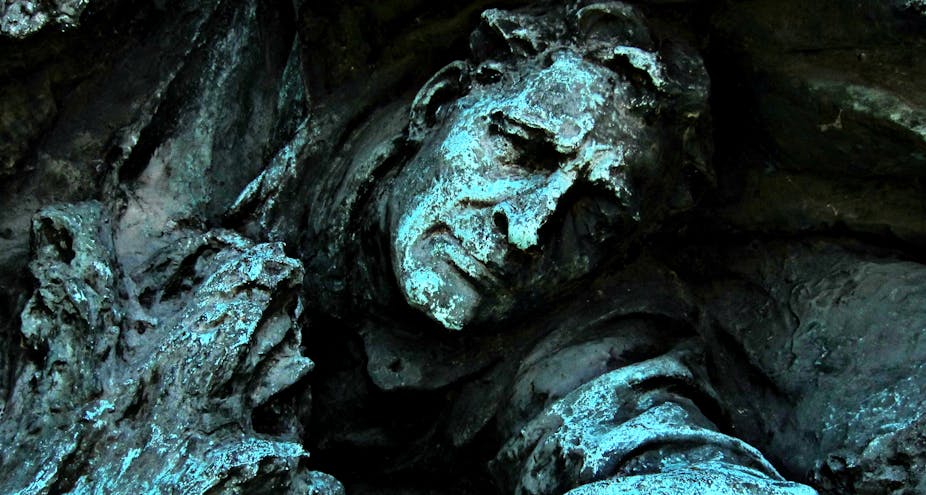As we’ve marked the centenary of the first world war in 2014, the great poets of that conflict – Wilfred Owen, Siegfried Sassoon, Rupert Brooke – have brought the literature of conflict into focus.
But modern conflicts differ from that sui generis killing-fest of the early 20th century. As Mary Kaldor of the London School of Economics puts it, ours is an era of “new wars” in which political violence is protracted. Wars are more often intra-state affairs in which rival ethnic and religious groups attack each other, or oppressed groups and authoritarian governments do. We need only to look to Syria for a contemporary example, and to recall relatively recent strife in Bosnia, Northern Island and Egypt.

South African poet Nadine Gordimer died this year and Irish poet Seamus Heaney in 2013 – two Nobel laureates who were intimately concerned with the nature of political conflict and the difficulty of its resolution in their respective homelands of Northern Ireland and South Africa. Our shared memory of the first world war has been significantly shaped by poets and novelists – so what role does literature play in the aftermath of this new kind of political conflict?
How can literary texts help understand the complexities of transitional justice and difficulties of social reconciliation? Can literature contribute to peace building, helping us learn lessons from these “new” conflicts in the modern era? Could a work of fiction constitute a truth commission in its own right, a way of both remembering the past and of forgetting it and moving on?
A new object of study
Post-Conflict Literature is part of an emerging field in the discipline of literary studies. It entails a self-conscious examination of literature, and the discipline of literary studies, considering the ability of both to interrogate and explore the legacies of political conflict around the world.
Underpinning this new subject is a belief that the value of literature has something to do with the way it helps us understand the world. Works of post-conflict literature can offer insights into our social wellbeing, insights that are rooted in, rather than at odds with, literature’s distinctive uses and configurations of language.

It arises out of two, inter-related contexts.
First, while there is an expansive scholarship devoted to war writing, less attention has been paid to the ways in which writers approach the legacy and aftermath of political conflict.
Second, the last 20 years have seen the emergence of a new academic sub-discipline, Peace and Conflict Studies. The subject draws on sociology, political science and legal studies, but proponents have not paid much attention to date to the important role that literature can play in mapping this terrain.
What Peace and Conflict Studies has done is introduce a new theoretical vocabulary, including concepts like truth and reconciliation, post-traumatic memory, historical reckoning and therapeutic storytelling. Literary texts provide a form of deep and protracted engagement with the complex and difficult nature of coming to terms with the traumatic past.
In the 1991 poem Cure at Troy, Seamus Heaney wrote:
No poem or play or song,
Can fully right a wrong
Inflicted and endured.
We must be cautious of offering easy aesthetic remedies for experiences that are both harrowing and deeply traumatic; but literature is a tool that can help us think through and make sense of the moral complexities that define post-conflict societies.
J.M. Coetzee’s Booker Prize winning novel Disgrace (1999) offers a careful examination of post-Apartheid South Africa and ways in which ideas about guilt, confession and retribution continue to define the psychological landscape of the rainbow nation.

Similarly, in Extremely Loud and Incredibly Close (2005) Jonathan Safran Foer approaches September 11 through the lens of an autistic boy. That boy’s search for answers about his dead father provides a compelling allegory for an event that is perhaps too traumatic and emotionally confronting to be tackled more directly.
Post Conflict Literature does not just mean literary fiction and poetry. Memoir and life writing provide important outlets to experiment with notions of therapeutic storytelling. When we read them, we discover how narrative art can be an attempt at ordering and making sense of the chaotic nature of so much traumatic experience.
Popular genres, including science fiction and the crime novel, have increasingly found themselves entering this discursive space. For writers like Deon Meyer and Lauren Beukes in South Africa, and Stuart Neville and Adrian McKinty in Northern Ireland, crime fiction’s interest in questions of historical justice, law and order, and a formal inclination toward the restoration of the moral order, have allowed the genre to make important and original contributions to this field.
Wars have changed since the early 20th century – and so has the literature of war. The study of post conflict literature takes these changes seriously – and provides us with insight about how literature shapes our understanding of the world before and after conflict.

